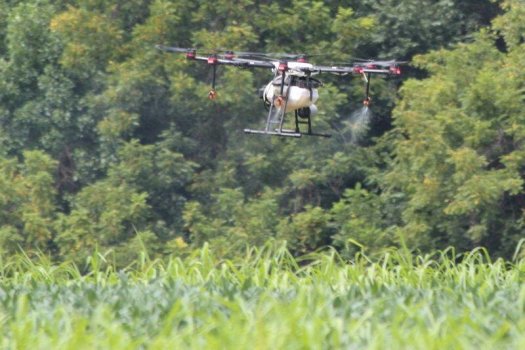As unmanned aerial vehicle (UAV), or RPAS (Remotely Piloted Aircraft Systems), capabilities improve and costs come down, having a drone on the farm is becoming more appealing. In addition to useful imaging and remote sensing capabilities that can help with crop management, drones can allow mid- or late-season pesticide applications or cover crop broadcasting without wheel track damage. They are also more maneuverable than airplanes and helicopters, especially for small, irregularly shaped fields.
Extension agronomists Heidi Reed, Casey Guindon and Dwight Lingenfelter say before you make the leap and buy a drone, make sure you consider current federal and Pennsylvania regulations around UAV flight and pesticide applications.
Drones weighing under 55 pounds at takeoff are regulated under 14 CFR part 107. Each drone pilot must have a current part 107 remote pilot certificate. First-time pilots must be at least 16 years old, be able to read, speak, write and understand English, be in physical and mental condition to safely fly a drone, and pass an aeronautical knowledge exam. The required steps for prospective pilots to register with the FAA, register for the knowledge exam, and complete the application for the certificate are outlined in detail on the FAA website.
Existing part 61 certificate holders can also get the part 107 certificate following the completion of an online training course. Once the certificate is obtained, it must be easily accessible by the remote pilot during all drone operations. Maintaining the certificate involves continued training courses to keep their aviation knowledge up to date. At this time, an online course is required to be completed by all pilots within 24 calendar months to maintain their remote pilot certificate.
Continue reading: https://www.lancasterfarming.com/farming-news/field-crops/how-to-incorporate-drones-into-farming-operations/article_afe20781-3354-5803-a4b7-629597db2c74.html
Extension agronomists Heidi Reed, Casey Guindon and Dwight Lingenfelter say before you make the leap and buy a drone, make sure you consider current federal and Pennsylvania regulations around UAV flight and pesticide applications.
Drones weighing under 55 pounds at takeoff are regulated under 14 CFR part 107. Each drone pilot must have a current part 107 remote pilot certificate. First-time pilots must be at least 16 years old, be able to read, speak, write and understand English, be in physical and mental condition to safely fly a drone, and pass an aeronautical knowledge exam. The required steps for prospective pilots to register with the FAA, register for the knowledge exam, and complete the application for the certificate are outlined in detail on the FAA website.
Existing part 61 certificate holders can also get the part 107 certificate following the completion of an online training course. Once the certificate is obtained, it must be easily accessible by the remote pilot during all drone operations. Maintaining the certificate involves continued training courses to keep their aviation knowledge up to date. At this time, an online course is required to be completed by all pilots within 24 calendar months to maintain their remote pilot certificate.
Continue reading: https://www.lancasterfarming.com/farming-news/field-crops/how-to-incorporate-drones-into-farming-operations/article_afe20781-3354-5803-a4b7-629597db2c74.html

